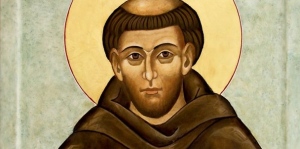 Few saints in the history of the church have had such an immediate and such a lasting success as Francis of Assisi. His first two followers, Bernard of Quintavalle and Peter of Catani, joined him in 1208, yet by 1222, three, if not five, thousand men are said to have assembled together for a Convocation. And in our own time the stream of visitors to Assisi and the flood of books and articles devoted to Francis show that the appeal of il poverello has not diminished. Indeed, the current Pope took the name Francis – for he was told “don’t forget the poor” when he was elected.
Few saints in the history of the church have had such an immediate and such a lasting success as Francis of Assisi. His first two followers, Bernard of Quintavalle and Peter of Catani, joined him in 1208, yet by 1222, three, if not five, thousand men are said to have assembled together for a Convocation. And in our own time the stream of visitors to Assisi and the flood of books and articles devoted to Francis show that the appeal of il poverello has not diminished. Indeed, the current Pope took the name Francis – for he was told “don’t forget the poor” when he was elected.
We know more of St. Francis than of any other medieval saint. Not only have we his own words, letters, and songs, but also the intimate accounts of several of his disciples, written down within twenty years after his death. These first biographies, by Brothers Thomas of Celano, Leo, Angelo, and Rufino, were soon revised and added to by other friars who wanted to call attention to one phase or another of Francis’ work and teachings. From this great store of authentic material a clear picture of the man emerges. St. Francis is one saint whom all Christians unite in honouring. Certainly no other has so appealed, even to non-Christians. And the appeal is timeless: Francis captured the imagination of his contemporaries as well as that of modern men by his unique simplicity and a pure grace of spirit. A classic collection of popular legends, the Little Flowers of St. Francis, first printed in 1476, contains charming and beautiful stories of Francis’ love of the poor, of animals, of all nature. In action he was original, in speech picturesque and poetic, yet he was a man utterly inspired by faith in and devotion to the risen Christ.
Assisi In Umbria
Francis was born in the stony hill-town of Assisi in Umbria, (Northern Italy) in the year 1181 or 1182. His father, Peter Bernadone, was a wealthy merchant. His mother, Pica, by some accounts was of genteel birth and of Provencal blood. Much of Bernadone’s trade was with France, and his son was born while he was absent in that country. Perhaps for this reason the child was called Francesco, “the French man,” though his name was John. As a youth he was ardent in his amusements and seemed carried away by the mere joy of living, taking no interest at all in his father’s business or in formal learning. Bernadone, proud to have his son finely dressed and associating with young noblemen, gave him plenty of money, which Francis spent carelessly.
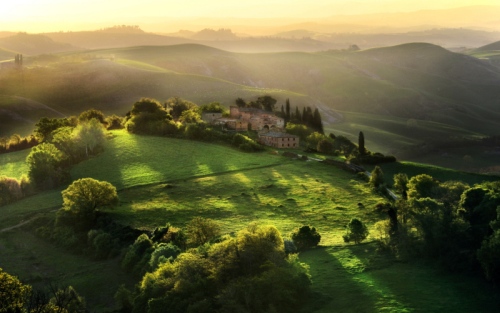
Serve the Master
Though Francis was high-spirited, he was too fastidious to lead a dissolute life. It was the age of chivalry, and he was thrilled by the songs of the troubadours and the deeds of knights. At the age of twenty or thereabouts, during a petty war between the towns of Assisi and Perugia, he was taken prisoner. During a year of captivity he remained cheerful and kept up the spirits of his companions. Soon after his release he suffered a long illness. This he bore with patience. After his recovery Francis joined the troop of a knight of Assisi who was riding south to fight under Walter de Brienne for the Pope against the Germans. Having equipped himself with sumptuous apparel and fine armour, he fared forth. On the way he met a knight shabbily clad, and was so touched with compassion that he exchanged clothes with him. That night he dreamed he saw his father’s house transformed into a castle, its walls hung with armour, all marked with the sign of the cross; and he heard a voice saying that the armour belonged to Francis and his soldiers. Confident now that he would win glory as a knight, he set out again, but on the first day fell ill. While lying helpless, a voice seemed to tell him to turn back, and “to serve the Master rather than the man.” Francis obeyed.
Go, Build My Church
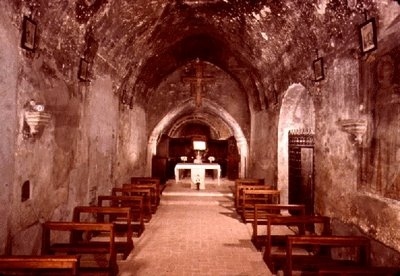
One day Francis prayed in the little church of St. Damian outside the walls of Assisi, he felt the eyes of the Christ on the crucifix gazing at him and heard a voice saying three times, “Francis, go and repair my house, which you see is falling down.”
The building, Francis observed, was old and ready to fall. Assured that he had now found the right path, Francis went home and in the singleness and simplicity of his heart took a horse load of cloth out of his father’s warehouse and sold it, together with the horse that carried it, in the market at the neighbouring town of Foligno. He then brought the money to the poor priest of St. Damian’s church, and asked if he might stay there. Although the priest accepted Francis’ companionship, he refused the money, which Francis left lying on a window sill. Bernadone, furious at his son’s waywardness, came to St. Damian’s to bring him home, but Francis hid himself and could not be found. He spent some days in prayer, and then went bravely to see his father. He was now so thin and ill-clad that boys in the streets pelted him and called him mad. The exasperated Bernadone beat Francis, fettered his feet, and locked him up. A little later his mother set him free and Francis returned to St. Damian’s. His father pursued him there and angrily declared that he must either return home or renounce his share in his inheritance—and pay the purchase price of the horse and the goods he had taken as well. Francis made no objection to being disinherited, but protested that the other money now belonged to God and the poor. Bernadone had him summoned for trial before Guido, Bishop of Assisi, who heard the story and told the young man to restore the money and trust in God. “God does not wish,” the bishop said, “to have His church profit by goods which may have been unjustly acquired.” Francis not only gave back the money but went even further. “My clothing is also his,” he said, and stripped off his garments. “Hitherto I have called Peter Bernadone father … from now on I say only, ‘Our Father, who art in Heaven.'”
il poverello
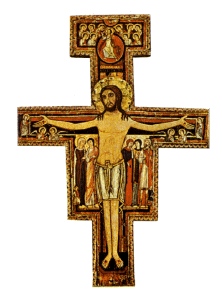
Francis begged and obtained materials with which to rebuild the little Church. He pursued the life of simplicity and became known as il poverello, ‘the poor one’, and he was slowly accepted with respect. Others were to join him, attracted by his simple life. One early disciple was Bernard Quintavalle, a rich and prudent merchant of the city, who invited Francis to stay at his house. At night they had long talks, and there was no mistaking Francis’ passionate dedication. Bernard soon informed Francis that he would sell all his goods and give the proceeds to the poor and join him. Shortly afterward, a canon of the cathedral, Peter de Cattaneo, asked to come with them. The three then went down to the Portiuncula, where, on April 16, Francis presented the distinctive tunic and rope with three knots to these two companions; and they built themselves simple huts. Brother Giles, a man of great gentleness and purity of spirit, was the next to come, and others soon followed. For a year Francis and his now numerous companions preached among the peasants and helped them in the fields. A brief rule was drawn up. Apparently it consisted of little more than the passages from the Gospel which Francis had read to his first followers, with brief injunctions to manual labour, simplicity, and poverty.
The Pope grants approval
In the summer of 1210 Francis went to Rome to obtain the Pope’s approbation. Innocent III, the great ruler of Catholic Europe, listened but hesitated. Most of the cardinals he consulted thought that the existing orders should be reformed before their number was increased and that the proposed rule for the new organisation, taken though it was from Christ’s own command, was impractical. Cardinal John Colonna, who pleaded for Francis, was deputed to examine him as to his orthodoxy, while Innocent considered the matter. Later the Pope dreamed he saw Francis propping up the Lateran Church with his shoulder. Summoning Francis and his companions, he orally approved their mission of preaching penitence, only requiring that they always get the consent of the local bishop; also they must choose a leader with whom the ecclesiastical authorities might communicate. Francis was thereupon elected head, and Cardinal Colonna gave them the monk’s tonsure. Francis and his little band returned to Umbria rejoicing.
A Gift of the Portiuncula
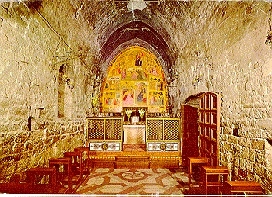
A temporary shelter was found near the foot of Monte Subacio, and from there they went out in all directions preaching repentance, and the blessedness of doing God’s will. The cathedral of Assisi was the only church large enough to hold the crowds that flocked to hear them, especially after it was known that their rule had papal approval. Soon the abbot of the Benedictine monastery gave them in perpetuity their beloved Portiuncula Chapel and the ground on which it stood. Francis would accept only the use of the property. The spirit of holy poverty must govern their order, if they were to be disciples of Him who had not where to lay His head. In token of this arrangement, the friars sent to the Benedictines every year as rent a basket of fish caught in a neighbouring river. In return, the monks gave the friars a barrel of oil. This annual exchange of gifts still goes on between the Benedictines of St. Peter’s in Assisi and the Franciscans of the Portiuncula.
The Little Brothers
To the order Francis gave the name of Friars Minor, Little Brothers, to express his wish that they should never be in positions above their fellows. Many cities were now anxious to have the brothers in their midst to act as peace-makers in periods of civil strife, and small communities of them sprang up rapidly throughout Umbria, Tuscany, and Lombardy. In 1217 a Convocation of all ‘Little Brothers’ was held at Assisi. They had now become so numerous and so widely dispersed that some more systematic organisation was necessary. Italy was divided into provinces, each in charge of a responsible minister provincial. “Should anyone be lost through the minister’s fault and bad example, that minister will have to give an account before our Lord Jesus Christ.” Missions were sent to Spain, Germany, and Hungary, and Francis himself made plans to go to France, of which he had heard so much in childhood from his father. He was dissuaded by Cardinal Ugolino, who, after the death of Cardinal John Colonna began to serve as advisor to Francis and all the ‘Little Brothers’. He sent instead Brother Pacifico and Brother Agnello; the latter was afterwards to establish the order in England.
Patron of the Animals
Francis’ striking rapport with animals is certainly the best-known and perhaps the most attractive aspect of his legend. It has encouraged Pope John Paul II to proclaim him patron saint of the ecological movement. Here are some examples:
Meanwhile, at a time when many were joining the brothers, Francis was passing through the valley of Spoleto. He came to a certain place near Bevagna, in which a great many birds of various types had congregated, including doves, crows and some others commonly called daws. When he saw them Francis left his companions on the road and ran over to them. When he got there, he saw that they were waiting expectantly and saluted them. Surprised that the birds had not flown away as they normally do, he was filled with joy and humbly begged them to listen to the word of God. Among the things he told them, he said the following: “My brothers the birds, you should love your creator deeply and praise him always. He has given you feathers to wear, wings to fly with, and whatever else you need. He has made you noble among his creatures and given you a dwelling in the pure air. You neither sow nor reap, yet he nevertheless protects and governs you without any anxiety on your part.”
Both Francis and his companions agree in reporting that, when he had spoken thus, the birds exulted marvellously in their own fashion, stretching their necks, extending their wings, opening their mouths, and gazing at him. Francis walked into their midst, touching their heads and bodies with his tunic. Finally he blessed them and, making the sign of the cross, gave them permission to fly off to some other place.
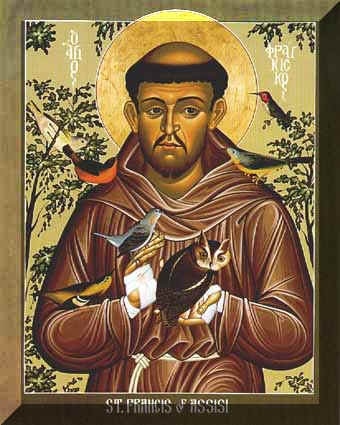
My sisters the swallows
One day he came to a town called Alviano to preach the word of God. Ascending to where he could be seen by all, he asked for silence. The people became quiet and waited reverently, but a flock of swallows building nests in that place continued to chatter away, making it impossible for the people to hear. Francis spoke to them,
“My sisters the swallows, it’s my turn to speak now, because you’ve already said enough. Listen to the word of God. Stay still and be quiet until it’s over.”
To the people’s amazement, the little birds immediately stopped chattering and did not move until Francis had finished preaching. Those who witnessed this sign were filled with wonder and said, “Truly this man is holy and a friend of the Most High.” Praising and blessing God, they devoutly hurried to touch his clothing.
Once, when he was staying in the town of Greccio, a hare was caught in a trap and brought live to Francis by a brother. Seeing the hare, Francis was moved to pity and said, “Brother hare, come here. Why did you let yourself be fooled in this way?” As soon as the hare was released by the brother, he dashed over to Francis and, without being forced to do so, settled into his lap as the safest place available. When he had rested there a while, Francis was stroking him with maternal affection, let him go so that he could return to the wild. Each time he was placed on the ground, the hare ran back to Francis’ lap. Finally Francis asked that the brothers carry him to a nearby forest. Something similar occurred with a rabbit on an island in the lake of Perugia.
The Parchment Given to Brother Leo (by Francis)
You are holy, Lord, you are the only God, you do wonders. You are strong, you are great, you are the Most High. You are the almighty King. You, Holy Father, are King of Heaven and Earth. You are Three and One, Lord God of Gods. You are good, all good, the highest good. Lord God, living and true. You are Love, Charity. You are wisdom; You are humility; You are patience; You are beauty, You are meekness, You are security; You are inner peace; You are joy; You are our hope and joy; You are justice, You are moderation, You are all our riches [You are enough for us]. You are beauty, You are meekness; You are the Protector You are our guardian and defender You are strength; You are refreshment; You are our hope; You are our faith, You are our charity; You are all our sweetness, You are our eternal life; Great and wonderful Lord, God Almighty, Merciful Saviour
Formation of a Religious Order
Francis was the head of the religious order known as Other Friars Minor. Today, the ‘Little Brothers” are known world-wide as Franciscans. Francis was prevailed on at times to submit to the prudent Ugolino. The cardinal actually presided at the Convocation of 1219, called, like its predecessor, a “mat chapter” because of the huts of wattles and straw hastily put up to shelter the five thousand friars present. The more learned and worldly-wise of the brothers were critical of the free and venturesome spirit of Francis, who, they claimed, was improvident and naive. They wanted more material security and a more elaborate rule, similar to that of the older orders. Francis defended his position with spirit: “My brothers, the Lord called me into the way of simplicity and humility, and this way He has pointed out to me for myself and for those who will believe and follow me … The Lord told me he would have me poor and foolish in this world, … God will confound you by your own wisdom and learning, and, for all your fault-finding, bring you repentance whether you will or no.”
From this “mat chapter” Francis sent some of his friars on missions to the infidels in Tunisia, Morocco, and Spain, while he himself undertook one to the Saracens of Egypt and Syria, embarking with eleven friars from Ancona in June, 1219. At the city of Damietta on the Nile Delta, which the crusaders were besieging, Francis was deeply shocked at the profligacy, the cynicism, and the lack of discipline of the soldiers of the cross. When, in August, the leaders prepared to attack, he predicted failure and tried to dissuade them from the attempt. The Christians were driven back with the slaughter of six thousand men, yet they continued the siege, and at last took the city. Meanwhile, a number of the soldiers had pledged themselves to live by Francis’ rule.
Sultan! Sultan!
He also paid several visits to the Saracen leader, Melek-el-Kamil, Sultan of Egypt. There is a story to the effect that he first went among the enemy with only Brother Illuminato, calling out, “Sultan! Sultan!” When he was brought before the Sultan and asked his errand, Francis replied boldly, “I am sent by the Most High God, to show you and your people the way of salvation by announcing to you the truths of the Gospel.” Discussion followed, and other audiences. The Sultan, somewhat moved, invited Francis to stay with him. “If you and your people,” said Francis, “will accept the word of God, I will with joy stay with you. If you yet waver between Christ and Mohammed, order a fire kindled and I will go into it with your priests that you may see which is the true faith.” The Sultan replied that he did not think any of his “imams” would dare to enter the fire, and he would not accept Francis’ condition for fear of upsetting the people. He offered him many presents, which Francis refused. Fearing finally that some of his Muslims might desert to the Christians, he sent Francis, under guard, back to the camp. Sickened by the senseless slaughter and brutality that marked the taking of the city, Francis went on to visit the Holy Places of Palestine.
Although Francis does not seem to have been interested in making any kind of social or political protest, he was clearly interested in building up a new pattern of human relationships. If we are prepared radically to abandon all our attempts to assert ourselves and to protect ourselves, then we can afford to begin being charitable. The following of Christ in his poverty and in his endurance leads to a new way of relating to other people. Francis insists very much that his followers should be a brotherhood and he takes steps to ensure that the hierarchy which has to develop within his order does not sabotage the basic brotherhood of all the friars. Francis wanted there to be a real affection, even tenderness between his friars, and this is often expressed in maternal terms. The Rule insists particularly on a warm attention being paid to the sick. And it appears that Francis’ dream was realised, at least at first, and that the friars did feel a real affection for one another and a profound joy in each other’s company. And Francis himself was so convincing a brother to them all that he was known simply as ‘the brother’.
Earlier Rule of St Francis:
(excerpt)
An Admonition to the Brothers
9. Therefore
let us desire nothing else
let us wish for nothing else
let nothing else please us
and cause us delight
except our Creator and Redeemer and Savior,
the one true God,
Who is the Fullness of Good
all good, every good, the true and supreme good
Who alone is Good
merciful and gentle
delectable and sweet
Who alone is holy
just and true
holy and right
Who alone is kind
innocent
pure
from Whom and through Whom and in Whom is
all pardon
all grace
all glory
of all the penitent and the just
of all the blessed who rejoice together in heaven.
10. Therefore
let nothing hinder us
nothing separate us
or nothing come between us.
11. Let all of us
wherever we are
in every place
at every hour
at every time of day
everyday and continually
believe truly and humbly
and keep in [our] heart
and love, honour, adore, serve
praise and bless
glorify and exalt
magnify and give thanks to
the most high and supreme eternal God
Trinity and Unity
the Father and the Son and the Holy Spirit
Creator of all
Savior of all who believe in Him
and hope in Him
and love Him
Who is
without beginning and without end
unchangeable, invisible,
indescribable, ineffable,
incomprehensible, unfathomable,
blessed, worthy of praise,
glorious, exalted on high, sublime,
most high, gentle, lovable,
delectable and totally desirable above all else
forever.
Amen.
Holy Charity
One of the things which impressed Francis’ contemporaries was the way in which he and his friars totally ignored the social stratification of the world around them. Anyone who joined Francis simply became one of the brotherhood, whatever his background. Aristocrats and nobodies, scholars and fools, in Francis’ eyes they were all the same.
And the friars were not meant to confine their charity to their own circle. As we have seen, an important factor in Francis’ own conversion was a change in his attitude to the involuntary poor and especially to lepers, and the early friars made a special point of consorting with lepers and other underprivileged people. Their poverty was evidently meant to be modelled on that of the real poor; if necessary they were to beg like other poor people and poor visitors ought to be able to feel at home among the friars. Just as Christ lived as one of us, so Francis wanted a real involvement of his friars in the lot of the poor.
Francis also believed that God had given him a special task as an ambassador of peace. The greeting which he used with everybody, ‘The Lord give you peace‘, was, he claimed, revealed to him by God, and it was one of his concerns to be a peacemaker wherever he could.
Francis and Happiness
On one occasion Francis called Brother Leo to him and then dictated to him a definition of true happiness:
“Suppose a messenger comes and tells me that all the Masters in the University of Paris have come to join the order: that is not true happiness. Suppose that all the prelates beyond the Alps, all the archbishops and bishops have come to join the order, suppose that the kings of France and of England have come too: that is not true happiness. Suppose that my brethren have gone to the unbelievers and converted them all to the faith; suppose that I have such grace from God that I heal the sick and work many miracles: I tell you that in all of these true happiness does not reside. So what is true happiness? I am on my way back from Perugia and I arrive here late at night, and it is the muddy time of winter and so cold that there are icicles hanging from the bottom of my tunic, which keep striking my legs so that they are wounded and bleeding. All muddy and cold and covered in ice, I arrive at the door and when I have knocked at the door and shouted for a long time, at last the brother comes and asks, ‘Who is it?’ I reply, It’s brother Francis.’ He says, ‘Go away, this is no time for travelling. You can’t come in.’ I plead with him, but he repeats, ‘Go away; you’re an ignorant simpleton. You are certainly not going to come in here with us; we have quite enough people here and they are quite good enough, we do not need you.’ Once more I stand at the door, saying ‘For the love of God, take me in just for this night.’ But he says, I won’t. Go to the Crutched Friars and ask there.’ I tell you, if I have patience and am not upset, this is where true happiness lies and true virtue and the salvation of my soul.”
In June, 1224, Francis attended his last Convocation, at which the new rule was formally delivered to the provincial ministers. In August, with a few of the brothers closest to him, he made his way through the Apennine forest to the peak of Alvernia, a place of retreat put at his disposal years earlier by the lord of Chiusi. A hut of branches was built for him, a little way from his companions. Brother Leo daily brought him food. His fears for the future of the order now increased and reached a climax. And here it was, on or about Holy Cross Day, September 14, that at sunrise, after a night of prayer, he had a vision of a winged seraph, nailed to a cross, flying towards him; he also felt keen stabs of pain in hands, feet, and sides. The vision vanished, and he discovered on his body the stigmata of the crucified Christ. During his lifetime, few persons saw the stigmata, called by Dante, “the ultimate seal.” Thenceforth he kept his hands covered with the sleeves of his habit, and wore shoes and stockings. To those who were there with him, he disclosed what had happened, and within a few days composed the poem, “Praise of the Most High God.”
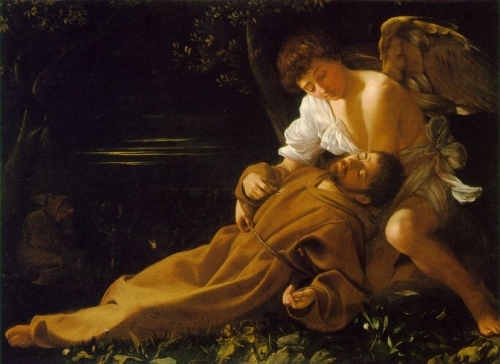
Francis goes home
During the winter he preached a little, and dictated a long letter to his brothers, which he hoped would be read at the opening of future general chapters. They were to love one another, to love and follow Lady Poverty, to love and reverence the Eucharist, and to love and honour the clergy. He also composed a still longer letter to all Christians, repeating his message of love and harmony. Yearning to be at home, when spring came he was carried north to Assisi and lodged in the bishop’s palace, but these fine surroundings depressed Francis, and he begged to be taken to the Portiuncula. As they bore him down the hill, he asked to have the stretcher set down, and turning back for a moment towards the city he blessed it and bade it farewell. At the Portiuncula he was able to dictate his Will, a final, firm defence of all he had been and done. No one coming after him must introduce any gloss to explain away any part of the rule or of this Will, for he had written it “in a clear and simple manner” and it should be understood in the same way and practiced “until the end.” As darkness fell on Saturday, October 3, 1226, Francis died.
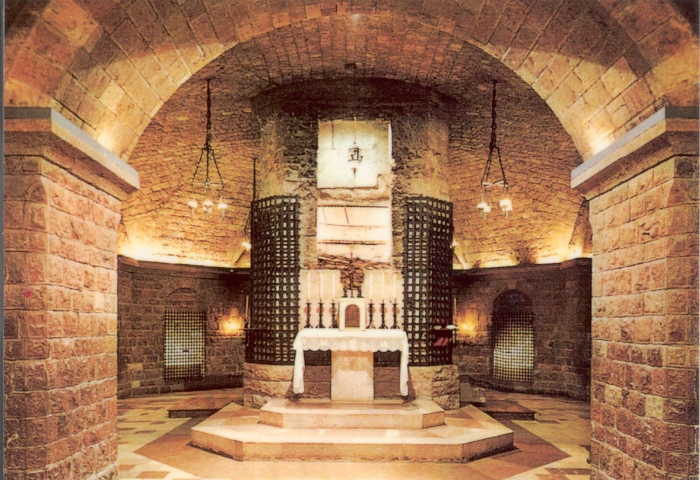
He had asked to be buried in the criminals’ cemetery in the Colle d’Inferno, but early the next morning a crowd of his fellow citizens came down and bore his body to the Church of St. George in Assisi. Here it remained for two years, during which time a process of canonization was being carried through. In 1228 the first stone was laid for the beautiful basilica built in Francis’ honour, under the direction of Brother Elias. In 1230 his body was secretly removed to it and, in fear that the Perugians might send a raiding party to steal it, buried so deep that not until 1818, after a fifty-two days’ search, was it discovered beneath the high altar of the lower church.
The Canticle of the Sun [St Francis of Assisi]
O most high, almighty, good Lord God, to Thee belong praise, glory, honor, and all blessing!
By Thee alone, Most High, were all things made and no man is worthy to speak Thy name.
Praised be my Lord with all his creatures, especially Brother Sun, who brings us the day and brings us the light; fair is he and shining with a very great splendor; Most High, he signifies to us Thee!
Praised be my Lord for Sister Moon, and for the stars, which He has set in heaven clear and precious and lovely.
Praised be my Lord for Brother Wind, and for air and cloud, calms and all weather, by which Thou upholdest life in Thy creatures.
Praised be my Lord for Sister Water, who is very serviceable unto us, and humble, and precious, and clean.
Praised be my Lord for Brother Fire, through whom Thou givest us light in the night; and he is beautiful and joyous, and very mighty, and strong.
Praised be my Lord for our Sister, Mother Earth, who doth sustain us and keep us, and bring forth divers fruits, and flowers of many colors, and grass.
Praised be my Lord for those who pardon one another for His love’s sake, and who endure weakness and tribulation; blessed are they who peaceably endure, for by Thee, Most Highest, shall they be crowned.
Praised be my Lord for our sister the death of the body, from whom no man living can escape. Woe unto them who die in mortal sin.
Blessed are they who are found walking by Thy most holy will, for the second death shall do them no harm.
Praise ye and bless my Lord, and give thanks unto Him and serve Him with great humility.
Grazia
St Francis was an Italian, and obedient to God in the Roman Catholic Church. He had an enduring devotion to Christ in his poverty, and like Mother Teresa, a devotion to Christ in his most distressing disguise as the poor one, the leper, and the outcasts of society. St Francis also had a devotion to the Christ Child [we inherit our Christmas Crib with the manger and animals surrounding the new-born Christ from St Francis] and to Mary, the Mother of God. He was faithful to the laws of the Church, kept fasts and said the daily prayers as prescribed by the Church for its official members.
People knew Francis was a saint while he was alive. Thousands rushed to touch the hem of his garment, to take something he had handled to a sick person for a healing, and indeed thanked God for the good things he had wrought through Brother Francis, and the example he set. On one occasion, some people took the donkey that had carried Francis to the house of a sick one, and took the saddle inside for the sick one to touch, for healing.
Brother Sun and Sister Moon—Sister Death and Brother Ass. St Francis called his body ‘Brother Ass‘ and frequently apologised to his body for the ill-treatment he meted out to it. It seems St Francis knew “I am not the body” and that the body was the vessel of the Soul, which had to be returned to God at the time of death, spotless, pure, and the reflection of God Himself.
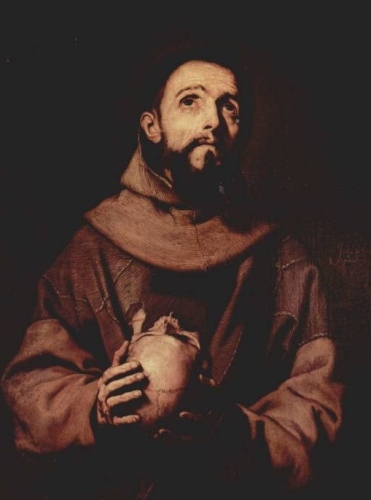
The Church knew that Francis, il poverello, was a saint also. Within two years of his death, he was canonized, so strong was the universal proclamation of this man’s holiness and good example for the Universal Church. It is sacred recognition of the holiness of Francis – the poor one – that has been well and truly vindicated due Francis’ continuing veneration across religious boundaries. Francis’ song, Lord, make a means of your peace, is sung by adherents of many different faiths. Thus we know Francis was truly our universal brother, for he promoted the Fatherhood of God and the Brotherhood of man.
Francis and World Peace
It seems now that Francis is patron of inter-religious prayer and interfaith activity. Pope John Paul II organised the first World Day of Prayer for Peace in Assisi, Italy, on October 27, 1986. In all, there were 160 religious leaders spending the day together with fasting and praying to their God or Gods. They represented 32 Christian religious organizations and 11 other non-Christian world religions.
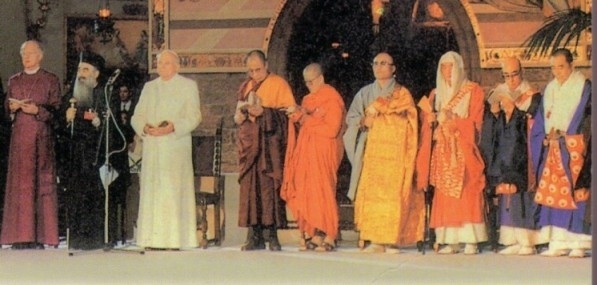
The 25th Anniversary of this event took place on Thursday, October 27, 2011. Two and a half decades later, Pope Benedict XVI invited nearly three hundred representatives of the religions of the world as well as a few non-believers to participate in the 25th anniversary of the World Day of Prayer for Peace: A Day of Reflection, Dialogue and Prayer for Justice and Peace in the World, on the theme Pilgrims of Truth, Pilgrims of Peace. The representatives attending the gathering included about 60 Catholics, 60 Orthodox and Protestant Christians, 65 Muslims, 65 Buddhists, eight Jews, seven Hindus, six Shintos, five Sikhs, four non-believers, three Confucists, three Taoists, one Jain, one Baha’i and one Zoroastrian.
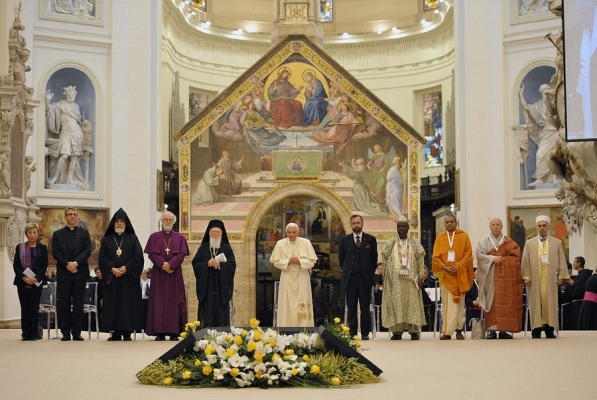
World Day of Prayer, Assisi, October 27, 2011
This work recently appeared on narayanaoracle.com and is © Chris Parnell
![]()

